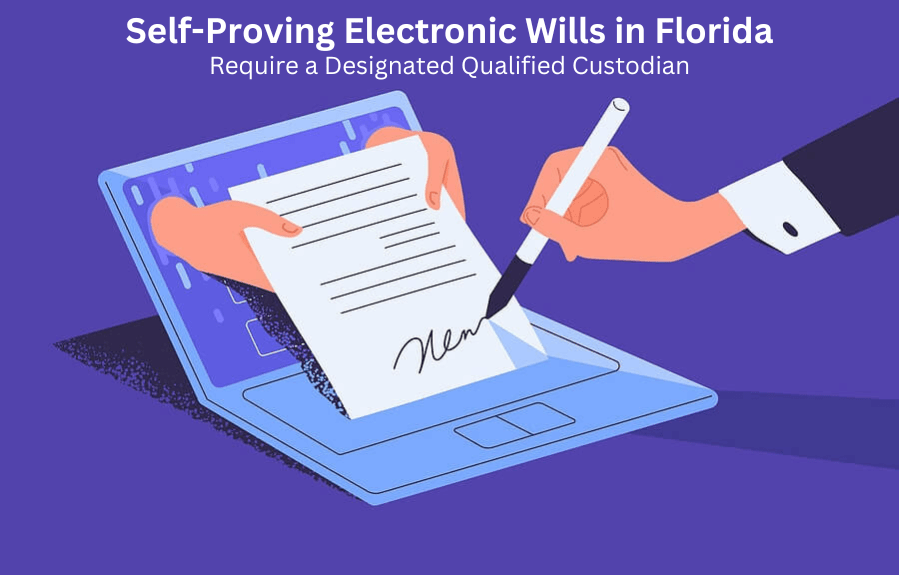Florida Self Proving Electronic Wills and the Qualified Custodian
As technology continues to advance, so does the way we handle legal matters, including estate planning. In Florida, electronic wills have become a popular alternative to traditional paper-based wills. However, to ensure a smooth probate process, it’s crucial to understand that Florida electronic wills are not self-proving unless a qualified custodian of the electronic will is designated in the document.
In this blog, we’ll explain what self-proving wills are, the role of a qualified custodian, and how to make sure your electronic will is self-proving. We’ll also introduce Florida Document Specialists, a trusted qualified custodian of electronic wills in Florida.
What is a Self-Proving Will?
A self-proving will is a legally recognized document that requires minimal additional evidence to be considered valid during the probate process.
The self-proving aspect of a will can save time, reduce costs, and minimize disputes over the validity of the document. In Florida, a traditional paper will becomes self-proving if it includes a self-proving affidavit signed by the testator (the person making the will) and two witnesses, all of whom sign the affidavit in the presence of a notary public.
Electronic Wills in Florida
In 2020, Florida passed the Electronic Wills Act (Florida Statute 732.521-732.529), which allowed for the creation of electronic wills. These digital documents have the same legal standing as traditional paper wills, provided they meet specific requirements, including the presence of an “electronic signature.”
However, an electronic will is not considered self-proving by default, even if it contains a notarized self-proving affidavit and meets all other requirements. Florida Statute 732.523 explains this in detail.
The Role of a Qualified Custodian
For an electronic will to be self-proving in Florida, a qualified custodian must be designated in the document. A qualified custodian is a person or entity responsible for maintaining the electronic will and ensuring its safekeeping. The Electronic Wills Act sets forth specific criteria that a qualified custodian must meet, including:
- Being a resident of Florida or incorporated or organized under Florida law.
- Maintaining a physical office in Florida for providing custodial services.
- Providing the testator and the testator’s personal representative with access to the electronic will.
- Maintaining a system for the secure storage of electronic records, including protecting the records from unauthorized access and disclosure.
- Retaining the electronic will in a way that prevents tampering or unauthorized changes.
- Carrying cyber insurance to protect against hacking, data loss, and other digital threats.
Florida Document Specialists is a qualified custodian of electronic wills in Florida, meeting all the criteria set forth by the Electronic Wills Act. By designating Florida Document Specialists as your qualified custodian, you can ensure that your electronic will is self-proving and safeguarded against potential issues during the probate process.
The Dangers of Attorneys and Online Notaries Not Familiar with the Law
Unfortunately, not all attorneys and online notaries are well-versed in the requirements for self-proving electronic wills in Florida. Some attorneys and online notaries may notarize electronic wills without designating a qualified custodian, which renders the wills not self-proving and potentially defective. This oversight can cause significant issues during the probate process, including delays, increased costs, and disputes among family members. Additionally, a defective electronic will may require the court to admit additional evidence to prove its validity, which could be a time-consuming and costly process.
Avoid Problems
To avoid these problems, it’s essential to work with knowledgeable professionals, such as a well-informed document preparation service and a reputable online notary service, when creating your electronic will. By taking the time to research and choose a qualified custodian like Florida Document Specialists, you can ensure your electronic will is self-proving and compliant with the Electronic Wills Act. This extra effort will ultimately help guarantee a smoother probate process and protect your estate’s assets for your loved ones.
Final Thoughts
To make your electronic will self-proving, ensure that it designates a qualified custodian like Florida Document Specialists, who meets the requirements set forth by the Electronic Wills Act. The document should also include an electronic notarization by a Florida notary public and electronic signatures by the testator and two witnesses. As with traditional wills, all parties must sign in the presence of each other. By taking these steps, you can help guarantee a smooth probate process and protect your estate’s assets for your loved ones.

